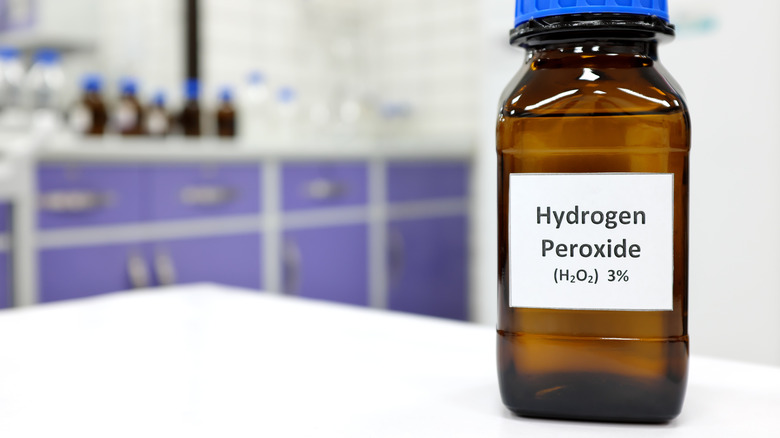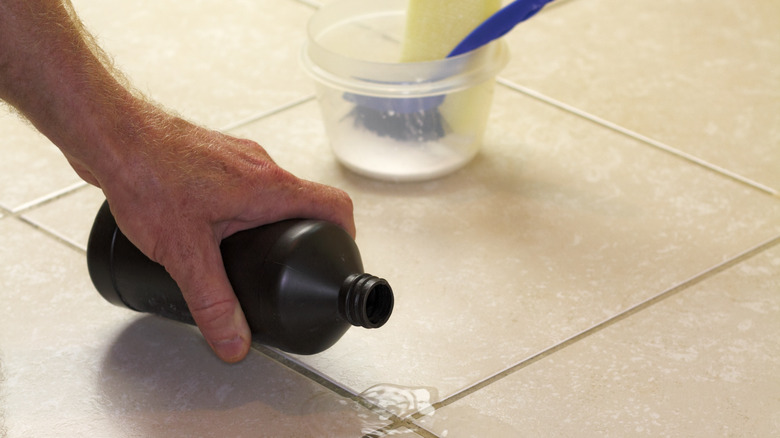Does Hydrogen Peroxide Expire, And Can You Still Clean With Old Product?
Hydrogen peroxide (H2O2) is touted as nothing short of a miracle elixir in some circles. People claim it's used for everything from removing laundry stains to whitening teeth. That is, of course, assuming the solution you have in your bathroom cabinet or under the kitchen sink is viable. Simply put, yes, hydrogen peroxide expires. One of the biggest mistakes you're making when cleaning with hydrogen peroxide is using a degraded solution. Old H2O2 turns to water and oxygen (with the oxygen gas dispersing into the atmosphere), making it no more effective for cleaning than simple tap water.
A chemist in France, Louis Jacques Thénard, discovered hydrogen peroxide in the early 1800s. It wasn't until 1894, almost a century later, that German chemist Richard Wolffenstein produced a pure form of the chemical, helpful to consumers and industry alike. Today, H2O2 is used in a wide range of locations, from homes to paper mills. In a residential setting, you can use it for cleaning (you can easily revive dirty laminate floors with the product), bleaching (removing stubborn stains from linens and clothes), and disinfection. For example, a 2023 study published in Biofilm found that treating water used in dental water systems with low doses (0.02%) of H2O2 reduced the number of problematic bacteria like legionella.
The science
The most common concentration of hydrogen peroxide available to consumers is 3% or 6%. Is it helpful for cleaning? The answer is a resounding "yes" if at full potency but a clear "no" if it's degraded. Why? Well, H2O2 is highly reactive and degrades when exposed to catalyzers like air, sunlight (UV light), or environmental contaminants, hence why it's typically stored in a dark brown glass bottle. Upon exposure to any adverse conditions or just over time, hydrogen peroxide breaks down into water and oxygen gas. The gas quickly escapes whatever container the H2O2 is stored in, leaving just the water behind. Higher concentrations are not immune to deterioration — they break down faster. Because of this, hydrogen peroxide is one of the least environmentally harmful, cleanest household chemicals available to consumers. For example, it's perfectly safe to discard the no-longer-active liquid down the drain.
The deterioration may also occur faster if you live in a warm climate or have hot summers. In fact, it doubles for every fifty-degree (Fahrenheit) rise in temperature. The degradation rate is also affected by how concentrated and acidic or alkaline the hydrogen peroxide solution is. Colder, more watered down, and more acidic H2O2 is the most stable. Stabilized hydrogen peroxide contains additives to keep it, as the name implies, stable longer — around three years unopened. However, like its more volatile counterpart, it will eventually degrade.
Test it first
Checking the expiry date printed on your bottle of hydrogen peroxide can be helpful. However, it's not always an accurate indicator of efficacy because it assumes optimal storage conditions, which aren't always possible in a home setting. Instead, try the fizz test. Pour a splash — a teaspoonful or two — of the hydrogen peroxide directly from the bottle into your kitchen sink or a bowl of warm water. In fact, you can use any small container you have on hand for this test, from a cup to a measuring jug. If it effervesces like soda water (that's the oxygen gas escaping), it's viable. No bubbles mean it's degraded and no longer useful.
Check, too, if your H2O2 looks orange or yellow; it's a sign the solution is destined for the trash can. If you really want to get fancy (and have some college-level chemistry knowledge), you can use a hydrometer to determine the concentration of the hydrogen peroxide in your bottle. Generally, once a bottle is opened, the solution should be usable for about one to six months. In a sealed bottle, it lasts longer — somewhere between half a year and three years, depending on the storage conditions.


